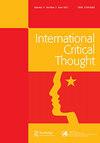Post-9/11 American Hegemonic (Imperial) Narratives: A Typical Version of Neo-Orientalism or an Alternative to Domination?
IF 0.4
Q4 POLITICAL SCIENCE
引用次数: 0
Abstract
ABSTRACT Hegemonic narratives have developed considerations of several perspectives on engaging with post-9/11 American imperialism and its system of power. This article deals with post-9/11 American novel, a version of neo-orientalist discourse that is inspired primarily by the American imperial ambitions and politics and the current public debates on Islamic terrorism, aggression, and backwardness. Employing insights from contemporary discussions around post-9/11 American hegemonic narratives and from contemporary hegemonic literature on the Middle East, the study examines narrative discourse to detect literary incitement to typological and racial representations. Analysis provides an examination of different perspectives concerning the origin of Islam in the 7th century in Arab peninsula, focusing on the first generation of Muslims’ intolerance towards non-Muslims and the Islamic heritage landscape as receptacle of the Middle East backward ideology and a place where radical ideology propagates the destruction of the west. Applying the notion of hegemonic literature as an exclusivist discourse, this study finds that pot-9/11 narratives and hegemony are symbiotic, reflecting the aspirations of the American policy in the Middle East region.后 9/11 美国霸权(帝国)叙事:新东方主义的典型版本还是统治的替代方案?
ABSTRACT Hegemonic narratives have developed considerations of several perspectives on engaging with post-9/11 American imperialism and its system of power.本文论述的是 "9-11 "事件后的美国小说,它是新东方主义话语的一个版本,主要受到美帝国主义野心和政治以及当前关于伊斯兰恐怖主义、侵略和落后的公开辩论的启发。本研究运用了当代围绕 "9-11 "事件后美国霸权叙事的讨论以及当代中东霸权文学的洞察力,对叙事话语进行了研究,以发现文学对类型学和种族表征的煽动。分析从不同角度审视了 7 世纪伊斯兰教在阿拉伯半岛的起源,重点关注第一代穆斯林对非穆斯林的不容忍,以及伊斯兰遗产景观作为中东落后意识形态的容器和激进意识形态宣传摧毁西方的场所。应用霸权文学作为排他性话语的概念,本研究发现 Pot-9/11 叙事和霸权是共生的,反映了美国在中东地区政策的愿望。
本文章由计算机程序翻译,如有差异,请以英文原文为准。
求助全文
约1分钟内获得全文
求助全文

 求助内容:
求助内容: 应助结果提醒方式:
应助结果提醒方式:


